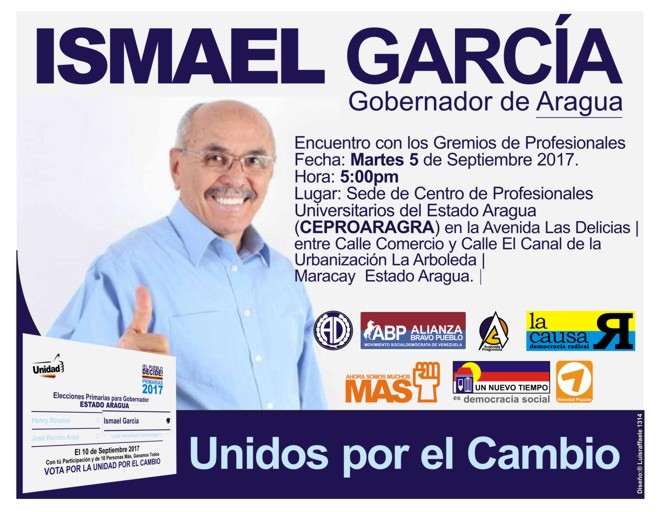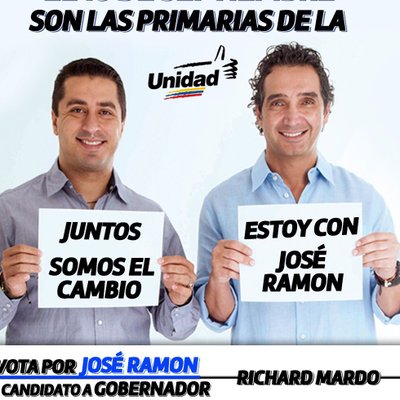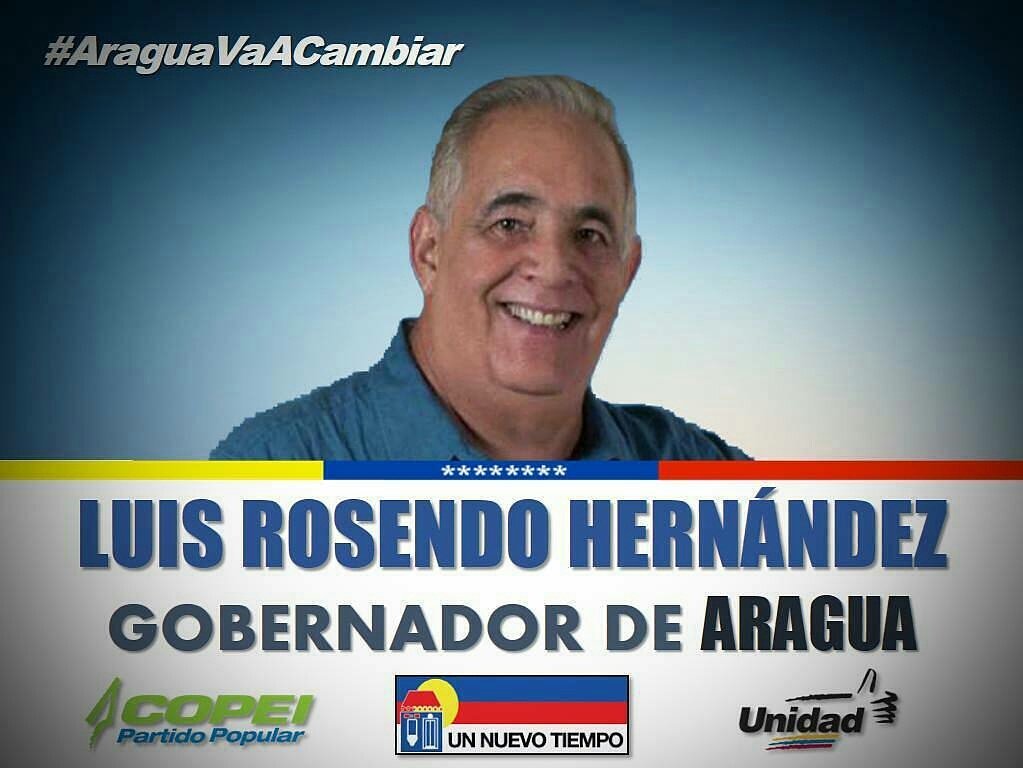Aragua Primaries: Of Ismael and Other Demons
Nobody likes Ismael García... but here in Aragua we're pretty much resigned to him being MUD's gubernatorial candidate.


Aragua is full of problems. Industry and agriculture are in the dumps, years of under-investment in infrastructure are causing natural disasters such as those in Choroní and the lake of Valencia, and armed gangs like El Juvenal and El Tren de Aragua, from Southern Aragua or the Tocorón prison, control whole pockets of the state.
After Rafael Isea’s disastrous term in office – so infamous that for many years they’ve been blotting out his face from billboards – and Tareck El Aissami’s gaudy kleptocracy you’d think the opposition would be ready to fight the good fight.
But we are not seeing it. With disqualifications and arrests on one side and political intrigue on the other, this is what we’re getting, instead:
Ismael García is someone who, for better or the worst, needs no introductions for the people of Aragua. A former La Victoria mayor, two-time deputy, and Globovision TV show host, he’s a veteran playing this game, and you can tell.
Most people I’ve talked to don’t trust Ismael, and for a good reason. Mainly supported by Acción Democrática, he’s seen as a shameless opportunist, going from hardline chavista to pejotero to quoting Rómulo Betancourt in front of mostly adeco audience in just a few years.
“I’ve always voted Acción Democrática, in good and bad times. But this time, I just can’t.” my grandma told me, confessing she hoped for José Ramón Arias, his contender from Primero Justicia, will win.
Neither she nor any of my close ones will move a finger for any of those people. In their eyes, they capitulated the moment they accepted this farce.
So Ismael García’s campaign seems to be all set to win. Running against Primero Justicia’s José Ramón Arias and Un Nuevo Tiempo’s Luis Rosendo Hernández, he’s by far the one with most recognition, with continuous appearances on regional – and national – media. It’s all but said that he’s the main MUD candidate. But his past is an easy target for his opponents.
Ismael presents himself as ‘the wise, conciliatory candidate’ who is willing to work with anyone who wants the best for all.
The event of his I went to was held at an auditorium of the Aragua Professional Center, a mid-sized, air-conditioned hall tended to be used by some of the half dozen or so labor associations that makes up the center.
Long past was the time when these rallies meant free food or beverages. The opposition is now content to just have a couple of spaces where you can feel comfortable to gather an audience, in this case, around 50 people. You couldn’t get more comfortable than this without starting to feel exclusitory.
Looking around, you could feel a specific smug, self-sufficient ambience in the room, a sense of chummy camaraderie. Most of the audience was made up of male doctors, teachers and engineers in their 50’s, most of them no doubt union leaders and representatives of professional associations, who are assured that Venezuela’s solution is to set the clock back to 1998 and pretend chavismo never happened. They are essentially the male version of your doña de Cafetal.
The very first thing Ismael addressed to this audience were the comments by José Ramón’s crowd about his former chavismo. He can’t deny them, of course, but claims the other main candidate was playing dirty. To counteract this, Ismael presents himself as ‘the wise, conciliatory candidate’ who is willing to work with anyone who wants the best for all.
Ismael was no different from his audience on clinging on nostalgia, mentioning his glory days in the MAS back in the 90’s when he was mayor of La Victoria and Carlos Tablante – who has given him his blessing – was governor and set up some terrific social programs we should bring back.
Running against Primero Justicia’s José Ramón Arias and Un Nuevo Tiempo’s Luis Rosendo Hernández, he’s by far the one with most recognition.
Two other Aragua deputies were at the event, La Causa R’s Mariela Magallanes and José Trujillo, whose connections with both Acción Democrática and professional associations – he’s the former chairman of Aragua Medical Association – have helped shape Ismael’s campaign.
But seeing Ismael in action, you understand why he’s stuck around so long. He has a very frank, straightforward style that vaguely reminds you of an outraged neighbor lodging a complaint. He speaks clearly, stumbling on the occasional word to give veracity, flailing his arms to punctuate what he says. What he says may not completely hold if you think about it too much, but he says things with such old-school arrechera that makes it contagious.
Most of the newest political speakers I’ve seen tend to either sound like youth pastors or school counsellors, and feel condescending and somewhat grander. With Ismael you don’t get that, even if his “concerned town hall speaker” shtick can occasionally feel studied.
He complains about populism and clientelism, but he’s plainly dying to set up his own clientelist network out of the gobernación; he calls out chavismo but implies the door is still open to them, as long as they repent. He says things are wrong and we have to roll up our sleeves and make them better but never says exactly what or how. He bends and adapts the crowd eats it up full.
I think Ismael just might be able to use his powers for good. Showing up in legislative sessions, visiting the state now and then, saying reasonable things with a tolerable dash of demagoguery. That’s what I voted for him for the National Assembly.
But really, the only thing I expect from him is to remain in the Assembly for the rest of his period. Ganar espacios is useless if you don’t defend them. But apparently that’s too much to ask for Ismael and so many others.
José Ramón Arias
Richard Mardo was the first person I voted for in my life. I wasn’t impressed by him or his résumé, which consisted of a Business degree from Universidad de Carabobo and no prior experience in the public or the private sector beyond “selling textiles.”
Yet, he’s the face of Primero Justicia in the state and probably one of the top three opposition politicians in Aragua. So, last month when it was confirmed that he was barred from politics, people wondered “What would Primero Justicia do?”
Enter José Ramón Arias.
Who? That’s an excellent question. Most people I talked to have zero clue who he is. Arias is a young politician hoping a fresh face would seem appealing, especially up against someone with too much of a past, like Ismael.
Plus, he has some actual local political experience, which far is more than what we can say about Mardo when he ran for governor. He has served as deputy for the State Legislative Council and as number-two man for Primero Justicia in Aragua.
Now that Henry Rosales dropped the race, it shapes more and more like a generational conflict within the opposition. That should benefit Arias, right? On paper, he seems perfectly reasonable. Then, you look closely and see this:
Un recorrido extraordinario gracias Santa Cruz por tanto cariño. @richardmardo #JuntosSomosElCambio pic.twitter.com/f2bl4wCtNX
— Jose Ramón Arias (@joseramonaragua) August 29, 2017
That’s José Ramón walking with Richard Mardo while wearing a shirt with Richard Mardo on it. Seeing the picture without context, Arias doesn’t seem like the candidate, he seems a random bystander who Richard is convincing to vote for him. In fact, it’s almost impossible to find a picture of Arias without Mardo.
And it’s not just Richard Mardo handpicked his right-hand for the job. They are not shy that Arias is Mardo’s candidate. What’s truly appalling is that for all intents and purposes Richard is the candidate, José Ramón’s name just happens to be on the ballot. His whole campaign undermines him by making clear someone else will do his job.
Going to one of his rallies, I was struck by two things. First off, it was a crowd of over 40 people, mostly college kids from parties like PJ, VP and COPEI or student movements from several local universities but also a few mature people carrying banners and a 10-meter flag. Many of them, commented feeling left out.
The other thing that struck me? Their apparent disconnect with reality. One student movement delegate demanded the creation of an Aragua state university, another for a program that guarantees jobs for everyone who graduates from the teachers’ college he goes to. Only the UCV delegate, who talked about strategic alliances to promote agriculture seemed feasible.
When the candidate finally managed to say a few words, he didn’t come up with grand, impossible plans for the state.
They all kept insisting on calling José Ramón “the next governor” and wasted no time to frame the other candidate as the past that shouldn’t return and themselves as the future. There were also two National Assembly deputies, Amelia Belisario – who acted as an emcee – and Alfonso Marquina, who was the most grounded and insightful speaker of the event, next to José Ramón himself.
I almost laughed out loud seeing him with his Mardo shirt and the two sitting together the whole rally, with Mardo making clear he was the one in charge, speaking before and after José Ramón.
When the candidate finally managed to say a few words, he didn’t come up with grand, impossible plans for the state or yell into the audience with uplifting platitudes (as Mardo did) but apologized for the delay, plainly stated who he was, what his job experience was and admitted that things won’t be easy but that he will try to do his best.
He didn’t win me over but was far better than I expected. Under different circumstances, he might have had a chance to shine by himself but in the struggle to win the hearts of the crowd uplifting platitudes defeat those who admit the challenges we have to face.
Luis Rosendo Hernández
I honestly don’t know what to make of Luis Rosendo. From what I could get from asking around he’s an old-school copeyano who has been active in politics since the early 80’s. He seems to hail from a softer era where politics was done by professionals in their spare time, never having fully made the transition into Chavista-era politics.
I mean handling flyers at 7 am on a Sunday?
But then, seeing his main supporters: one is UNT, that as far as we know is closer to the government in very compromising ways, and COPEI, whose leadership was chosen in a controversial TSJ ruling in a way many former militants affirm hands the party to government stooges.
This begs the question about Luis Rosendo’s intention. Is he a political dinosaur, trying to fight to do what he considers the best while clearly misreading the situation, or is he the human version of Min-Unidad meant to divide the vote?
Only time will tell.
Despite all that the government has done with the National Constituent Assembly, I was surprised to see many around still have their heart set on the elections. But hearts can get broken all too easily and whoever wins on Sunday I can’t help but feel that Aragua has already lost.
Caracas Chronicles is 100% reader-supported.
We’ve been able to hang on for 22 years in one of the craziest media landscapes in the world. We’ve seen different media outlets in Venezuela (and abroad) closing shop, something we’re looking to avoid at all costs. Your collaboration goes a long way in helping us weather the storm.
Donate







